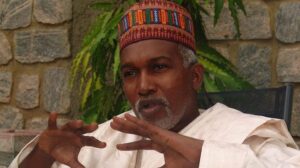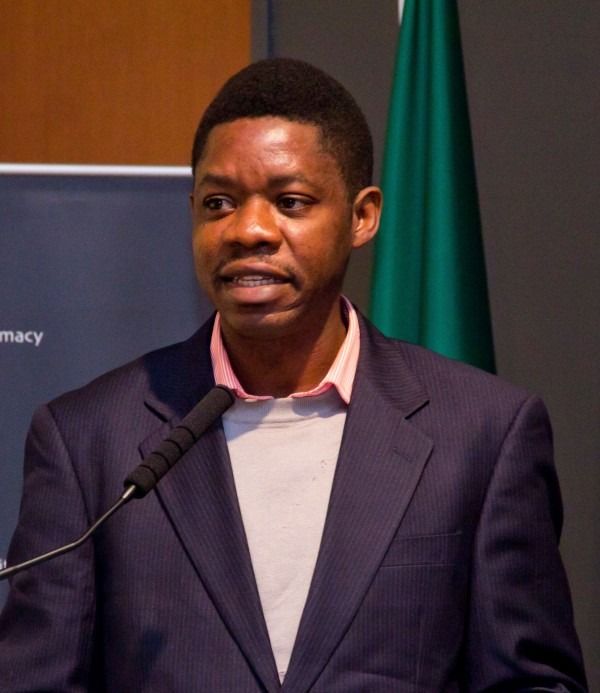By SIMBO OLORUNFEMI

“Flavor Flav has problems of his own,
I can’t do nuttin’ for ya man” – Public Enemy
Nigeria’s Foreign Affairs Minister, Yusuf Tuggar, took quite a few people by surprise during a live TV interview when, in addressing the reported demand by the US for Nigeria to accept deportees from Venezuela, he instinctively tapped on a punchline from the American RAP group, Public Enemy, to make the point about Nigeria’s unwillingness to bow to pressure from the United States of America to accept Venezuelan deportees. It was a line by Flavor Flav, in the song “Fight the Power”: ‘Flavor Flav got problems of his own, I can’t do nuttin for ya man,’ and Tuggar rode on the back of that line, saying, “We have enough problems of our own; we cannot accept Venezuelan deportees.”
The message was simple – Nigeria has more than enough on its plate at the moment; the question of taking on more does not arise. Perhaps it was the flavour he brought into his delivery that made it resonate not just with the Americans, but even at home. Apparently, it is a language Tuggar is at home with, as the subsequent release of his all-time top 10 RAP songs, all-American, has now confirmed. As it has turned out, that one-liner has helped to underscore the Tuggar Doctrine of “Strategic Autonomy” along with the 4Ds framework (Democracy, Development, Demography, and Diaspora), which he laid out as pillars around which Nigeria’s foreign policy would be redefined upon assuming office as Nigeria’s Foreign Affairs Minister two years ago.
The Doctrine of Strategic Autonomy, Tuggar stated, is the fulcrum of the Tinubu administration’s foreign policy, providing “the clarity to engage with any and all nations on the basis of our national interests and not those of others.” It was a statement to the effect that Nigeria’s foreign policy was going to be defined by independence of thought in accordance with the national interest, with emphasis on national sovereignty, regional cooperation, and leveraging Nigeria’s diaspora and economic assets. “As a nation, Nigeria is adult and sophisticated enough to deal with countries without being unduly influenced, because that has been part of our historical and civic tradition,” Tuggar submitted.
While what that meant might not have been clear to some observers at the time, especially when the Minister also argued, rightly so, that the foreign policy thrust of Nigeria is a constitutional imperative, with the Constitution taking precedence over “the manifesto of a political party or predilections of a particular politician”. So, while Prof Bola Akinterinwa cites five principles (foundational, Pan-Africanist, Circumstantial, Internationally-inherited, and Constitutional) around which Nigeria’s foreign policy revolves, Tuggar’s view is that the grundnorm are the five foreign policy objectives listed in the Constitution: promotion and protection of the national interest, African integration and support for African unity, promotion of international cooperation for peace and mutual respect, respect of international law and treaty obligations, and promotion of a just world economic order. The Doctrine of Strategic Autonomy, like that of Concentricism and others enunciated by previous Ministers of Foreign Affairs, is an interpretation of the constitutional charge in line with the times and the strategic thinking to deal with it. Tuggar’s point is that, “…the contemporary nation-state system is highly competitive and Nigeria exists in a self-help world…(the) Constitution and international laws are meant to serve as guardrails in navigating the system.”
Scholars of Nigeria’s foreign policy are largely in agreement that the character and trajectory of Nigeria’s engagement with the world since the attainment of independence have largely been defined by the idiosyncrasies and outlook of the leaders at the helm of affairs. Two things discernible from a run-through of the different administrations are the correlation between domestic politics and foreign policy on one hand, as well as the central role played by leadership in the direction of Nigeria’s foreign policy and in the perception and determination of what constitutes national interest, which invariably is whatever leadership says it is. In the words of Prof. Joy Ogwu, Nigeria’s foreign policy has, over time, been “a reflection of the fundamental instincts of those who make it.”
READ ALSO: Accident claims four lives on Benin–Sagamu Road
Just as the imprints of the leaders (military and civilian) on foreign policy direction are evident, so are the signatures of the different Foreign Affairs Ministers over time. From Jaja Wachuku, who laid the foundations of Nigeria’s foreign policy by championing Nigeria’s sovereignty, Pan-Africanism, and anti-colonial stance, and a commitment to the principle of non-alignment in the early years after independence, all the way to Geoffrey Onyeama, who was the Minister in office before Yusuf Tuggar, each applied his understanding in forging a foreign policy framework best suited to the domestic realities of the country and the global environment at the time.
It is within that frame of reference that Minister Yusuf Tuggar’s doctrine of strategic autonomy and the 4Ds framework (Democracy, Development, Demography, and Diaspora), as tools for a redefinition of Nigeria’s foreign policy in tandem with President Bola Tinubu’s worldview and reforms-led economic agenda, sit. This is a strategic framework with emphasis on an independent, national interest-driven diplomacy with focus on national sovereignty, regional cooperation, and leveraging Nigeria’s demographic, diaspora and economic assets to achieve Nigeria’s foreign policy objectives, with the current realities and prospects for the future as a guide.
Whereas Nigeria’s foreign policy outlook has been largely framed over the years around the doctrine of concentric circles, which prioritised Nigeria’s immediate neighbourhood, followed by the sub-region, the continent, and the world, in that order, which then propelled an Africa-centric foreign policy posture, it does appear though that Tuggar’s doctrine of strategic autonomy, while not jettisoning the principles undergirding that posture, adopts a broader and more dynamic outlook to engagement such that Nigeria’s priority is firmly the attainment of national interest through autonomy in thought and strategy. Even if the vehicles through which that is achieved are ‘neighbours’ other than by ‘territorial contiguity’.
The Tuggar doctrine is particularly interesting, because it stands its ground on the age-old fundamentals of Nigeria’s foreign policy, firmly embracing these principles as constitutional imperatives. He argues that “in reality, the contemporary nation-state system is highly competitive and Nigeria is now a country guided by the rule of law and a constitution that clearly defines our system of government. This includes our foreign policy objectives, and rightly so, because in an interconnected world, we define our sovereignty in the context of certain key principles… The same Chapter of the Constitution goes on to state [Nigeria’s five foreign policy objectives: promotion and protection of the national interest, African integration and support for African unity, promotion of international cooperation for peace and mutual respect, respect of international law and treaty obligations and promotion of a just world economic order. Those who suggest Nigeria does not have a foreign policy or those who agitate for a shift away from an Afro-centric foreign policy are wrong; either they are ill-informed or deliberately disingenuous.”
So, in advocating for Nigeria’s continued leadership in Africa, which he reminds us is further reified by the Constitution, Tuggar has a unique depth of understanding of regional issues and the world at large that appears to have influenced his outlook and doctrine of strategic autonomy, which makes it particularly interesting. “In reality, the contemporary nation-state system is highly competitive and Nigeria exists in a self-help world. Our Constitution and international laws are meant to serve as guardrails in navigating the system… The Tinubu administration comes at a time when an interlocking suite of occurrences have made our neighbourhood less secure; the implosion of Libya, failure of the EU Sahel Strategy, terrorism and criminal gangs, effects of climate change and population explosion. Nigeria did not create these challenges and was equally contending with its own domestic issue as these challenges escalated.”
It is within that context that Tuggar had argued that “to achieve a lasting peace in Libya and the Sahel, Nigeria needs to deal with all the countries in the neighbourhood, as well as all the major powers… (as) it does not make sense to simply deduce that Nigeria has to distance itself from France because that is the prevailing trend in its former colonies.” His preference is for pragmatic engagement, even while pushing for regional cohesion through ECOWAS, while maintaining an active profile in the stage, without the encumbrances that might come on account of ideological alignments and other interests.
One does not have to listen to Public Enemy to come to the realisation that Tuggar leans towards a more assertive diplomatic posture. “Nigeria is adult and sophisticated enough to deal with countries without being unduly influenced, because that has been part of our historical and civic tradition. Nigeria’s principle of strategic autonomy is one that abhors the presence of foreign forces and private military companies in our region, whether from east or west,” he says.
There is a sense of self-assurance and clarity of focus and agenda-led purpose to Nigeria’s steps around the world of late that might even be mistaken for bravado. It is good to see how the relationship between República Federativa do Brasil, the largest country in South America, and the Federal Republic of Nigeria, the largest country in Africa has evolved, and is strengthening by the day, even though the relationship between Brazil and the US, with which Nigeria has also managed to maintain a cordial relationship, is at an all-time low. It is instructive that Nigeria has been able to navigate its way around this intricate web being spun by President Trump’s unconventional approach to international relations and his determination to crush BRICS. It is also good to see the rapport between President Tinubu and Luiz Inácio Lula da Silva.
From a start that saw critics panning the Tinubu administration for its management of Nigeria’s foreign policy, particularly in the manner in which the crises led to the decision by Burkina Faso, Mali, and Niger to withdraw from ECOWAS and later form the Alliance of Sahel States (AES), it is evident that the foreign policy machinery has fully come into its own. A firm and decisive direction is beginning to emerge, helping with a proper appreciation of the Tuggar Doctrine and Tinubu-plomacy, as some call it. The Doctrine of Strategic Autonomy has been likened to the principle of non-alignment as enunciated and pursued by the Tafawa Balewa regime, but while there might be a ring of that to it, and might even be built on that legacy, it has attributes that stand it apart. “His version of non-alignment is not passive. It is active, thoughtful, and assertive,” Umar Farouk Bala says.
Strategic autonomy, as defined by Tuggar and the Tinubu administration, is an active foreign policy doctrine with emphasis on autonomy in decision-making, with the realisation of Nigeria’s national interest being the primary objective. The Tuggar doctrine speaks to Nigeria not being caged by the boxes of Concentricism or Afrocentrism, while embracing the principles enunciated in Nigeria’s Constitution, being the fons et origo of Nigeria’s foreign policy. It speaks to clarity and independence in decision-making, with pragmatism being the core driver in managing relationships with neighbours and global powers in a world that has become increasingly multidimensional. It is a more nuanced and proactive approach to foreign policy in the light of contemporary geopolitical realities and Nigeria’s aspirations for economic development and greater influence in the region and on the world stage, which might explain what has been a renewed vigour in the footsteps of Nigeria around the globe. Someday, in reviewing the foreign policy thrust of the Tinubu administration, Yusuf Tuggar, throwing in a line from Public Enemy, might stand out as one of the defining moments.
*Olorunfemi is a specialist on Nigeria’s Foreign Policy, Communications Consultant, and Managing Editor of Africa Enterprise, Email: [email protected]













